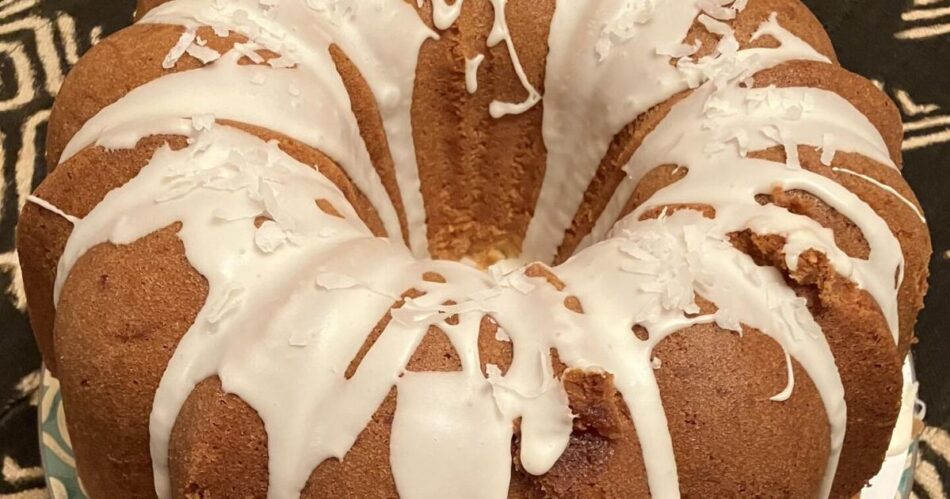Growing up in the Deep South, Sundays are sacred — curated for rest, gratitude and gathering. These days often begin with a visit to church and end with a spread of comfort food shared among family and friends. Among the fried chicken, collard greens and macaroni and cheese, one staple often graces the table without fail: pound cake. A simple yet decadent dessert, the pound cake is more than a treat; it’s a piece of Southern ancestral history, especially in African American and Gullah-Geechee households.
The pound cake is humble, made traditionally with a pound each of butter, sugar, eggs and flour. But while its ingredients are minimal, its impact is anything but. This golden-brown Bundt cake often arrives accompanied by a story: a tale passed down through generations, usually tracing its origins back to the matriarch of the family. For many Black families in the South, pound cake isn’t just dessert, it’s legacy.
Though the dessert’s roots trace back to European kitchens, its adaptation and reverence in African American communities, particularly among the Gullah-Geechee people, have elevated it to a cultural treasure. The Gullah-Geechee, descendants of enslaved Africans who lived along the coastal Sea Islands of the southeastern U.S., were able to preserve more of their African heritage due to the relative isolation of their communities. For them, food is more than sustenance — it is storytelling, survival and spiritual practice.
One person keeping this tradition alive is Ron Daise. Many remember him as “Mr. Ron” from the beloved 1990s children’s television show “Gullah Gullah Island,” which introduced countless viewers to South Carolina’s Gullah culture. But beyond the screen, Daise has continued to educate and preserve Gullah traditions through baking.
A slice of Ron Daise’s cream cheese pound cake.
As the youngest of nine children, Daise grew up at his mother’s side, watching her craft meals for the large family. His mother, Kathleen Grant-Daise, lovingly called “Zeae,” was particularly known for her pound cake. It was her signature offering. Inspired by her recipe and memory, Daise launched “GullahliciousCakes,” an Etsy-based bakery that brings the flavors of the Sea Islands to kitchens across the country.
Over the years, Daise has perfected his pound cake recipe, incorporating creative twists like butterscotch, cream cheese and even edible gold. One of his signature cakes, the Sea Island Serenade, is topped with edible gold as a nod to “Carolina Gold” rice — a historical staple crop of the region.
“Seasonings make the difference,” Daise explained.
But Daise’s cakes are more than flavor and flair; they are spiritual experiences. Each Gullahlicious cake comes with a prayer.
“Gawd, bless ebbyboddy wha nyam disya cake from dey haid down to dey toe,” the Gullah prayer begins.
Loosely translated, it means, “God, bless everyone who eats this cake from their head down to their toe.”
It’s a sacred invocation, a reminder that in Gullah-Geechee tradition, food is always made — and eaten — with thanks.
“The idea of pound cake inspires us,” Daise said. “It stays with our bodies and shares our experiences.”
Like all his pound cakes, Ron Daise’s “Family Favorite” pound cake is inspired by his mother’s recipe.
In this way, the dessert becomes a medium for preserving not just flavor, but faith, heritage and history. Daise emphasized that the foodways, spirituality and language of the Gullah-Geechee people “shape American heritage.”
His cakes, therefore, are not just confections, they are cultural artifacts.
For many fans of “Gullah Gullah Island,” Daise’s Etsy shop is a nostalgic homecoming.
“People know me as Mr. Ron from ‘Gullah Gullah Island,’” he said. “These are the cakes baked by that person. An exclusive experience.”
Reviews of GullahliciousCakes frequently mention how the taste brings back memories of grandmothers and Sunday dinners, of warmth and home. The cakes, which range from $30 for a half to $60 for the signature Blessings Cake, are available year-round. While Daise occasionally sells slices at festivals in the Lowcountry, he primarily operates online due to the delicacy and precision of his recipes.
In a world that often moves too fast to remember its roots, Daise offers a sweet reminder: history lives in our kitchens. Just as the rice fields of the South once held stories of labor and resilience, so too does the pound cake. It represents survival, community and the unyielding spirit of a people who found joy and beauty even in the harshest conditions.








